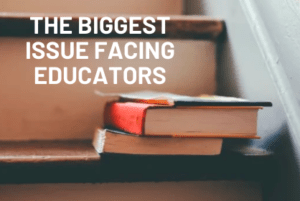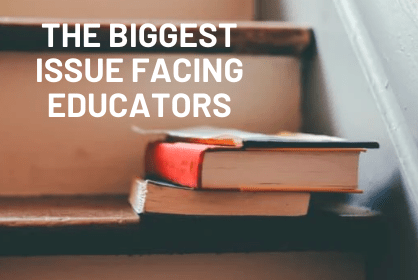After coming home overwhelmed and exhausted yet again, one of countless times since the start of September, I thought to myself, “What are the biggest issues you’re currently facing as an educator?”. I reflected on this question briefly as many ideas raced to mind. I had a lot to consider and, likely unsurprising to those who know me, even more to say. And yet, up until that time, I hadn’t considered the issue much less put my ideas to paper. Not once. Not even a single word.
In that moment, I considered the emotional toll of the past 18 months but specifically that of the last two and a half. Traditionally, I’m confident in my teaching abilities and practices in the classroom; this year, however, I’m struggling. And I’d be naive to think that I’m the only educator who is reeling from a lack of resilience, patience, and, most of all, time.

It could be argued that the latter of the aforementioned struggles has been a perpetual problem within education even before the onset of the COVID 19 pandemic. Teachers have never had enough time in the day to teach their lessons, conference with students, lesson plan effectively, and mark student work in a timely manner. Consider too that these duties are solely our teaching responsibilities and don’t include our commitments as coaches, both planning and running practices, attending interschool competitions, and making student mental health a priority within sport; our roles as department or team-teaching members, carving out time in an already packed schedule to meet, sharing best practices amongst colleagues, engaging in benchmark marking, or simply planning and aligning our courses; our duties as boarding school employees, sacrificing home time during a weeknight for an evening study, giving up our Saturdays for a weekend duty or programming, or trying to cohort students on a daily basis by an arbitrary measure; and the various miscellaneous responsibilities that eat away at our time as educators, including school initiatives, advisory roles, whole faculty meetings, parent-teacher interviews, report comments, and, (one of the worst culprits of all…) email.
Simply put, teachers in a normal year are charged with an impossible task: effectively meet the various demands of their job, go above and beyond with expectations that weren’t originally foreseen (because, let’s be honest, theirs always more as a teacher), and do so in a timeframe or within a school schedule that doesn’t allow for the hours needed to complete the work, all the while preserving one’s mental health to boot.
We already know that teaching in a regular (whatever that means anymore) school year is unsustainable (link, link, link), and yet, we’ve tried to go back to the way things were and in doing so have even further sacrificed our emotional wellbeing. Perhaps I’m being overdramatic, but I’ve always said to myself, even in my first year as a teacher, “the day I walk into work and no longer love what I do is the last day I’ll step foot in a classroom.” While I’m not ready to walk away from teaching, if I’m being honest, I’m not certain that I love my job as it currently stands. Like a bad relationship, it’s just not working for me. It’s negatively impacting my emotional well-being. And I suspect I’m not alone.
On plane rides (what are those again?), we’re always told to secure our own oxygen masks before assisting others. I want to preserve the resilience and learning of my students that has been lost over the past year and a half. But I can’t do that, effectively, without preserving myself. If we as teachers continue at this pace, we will burn ourselves out and it will be the students most impacted as a result. The next pandemic, or more accurately epidemic, will be that of mental health; teachers are the first responders for the preservation of student emotional wellbeing. But who takes care of the first responders?
Teachers need to look after themselves first by rethinking their teaching practices and their baselines. They need to prioritize their work at work and their home life at home. Likewise, administrators need to support teachers in their aim to do so. They need to welcome opportunities for honest and reflective feedback and provide teachers tangible time within the academic day to meet their work demands.
Office workers have realized that they don’t need to return to the workplace because the preservation of their well-being and effectiveness as employees are not dichotomous. Likewise, educators can’t simply return to the way things were without realizing the cost of doing so. We need to rethink our practices in preserving our mental health, we need administrative support in doing so, and we need to normalize advocating for one’s wellbeing.
Follow on Twitter @bjeblack

@bblack Brandon, thank you for sharing and for being vulnerable. I had a particularly exhausting day today myself (after a 15 hour round trip for one school hockey game yesterday). When I feel overwhelmed I always blame myself for not managing my time well. The reality is, we do not have enough time to manage. Our time with students, building relationships and conferencing is so valuable. We inadvertently jeopardize that time with the yard list of duties you have listed. I wonder when we might have the time to consider how we might best spend our time? Ironically this important conversation gets put on the back burner. If you could redesign the schedule to give both time and space to the important things, how might you do it?
Hi Brandon,
I always feel like you are reaching into the depths of my teaching soul when I read your posts. Time has never been more precious, and one of my new personal goals is learning how to maintain healthy boundaries, which can operate in direct tension with a teaching profession.
I think as all educators reflect on how we can best spend our time, I hope we land on the side of imperfection. That it’s okay if our lesson wasn’t polished or parts of an assignment had to be cut short….what matters most is that our students know we are beside them, helping them along their learning journey. And then I hope our administrators and boards feel that way, too.
Brandon,
I appreciate your post and the bravery that it takes to admit when it’s all too much. I hope you know you are not alone in these feelings and I think it’s important that we all speak up and connect to support one another. Authentic posts, like yours, help to normalize these feelings and that’s a huge help to others. Each day we see a focus on self-care that we’re bombarded with as teachers, it’s hard to feel this is yet another additional task that is left to each of us alone as the answer for feeling constantly overwhelmed. As @jpriolo mentioned, we often end up blaming ourselves for not managing our time well, which only adds to the tension within. Instead, I hope the conversation can shift for wellness to be a community goal that is prioritized as urgent and gives everyone time to recover and learn what to revise, cut, and keep from the collective learning during the last 20 months. One of the first posts I wrote for Cohort was about teaching as a work of heart. I can hear from your words and from knowing you, that you are a teacher who is full of heart. As a passionate educator, it’s hard to do less than your best when you simply don’t have the time, bandwidth, or support to finish in the way you envision. For the next while, I think we need to understand that there can be an “unconditional love for teaching” and for ourselves. One in which we use our heart to see that kindness to ourselves needs to come first, (like your oxygen mask reference) and that we can love what we do (but not always like it), that we can be teachers that show up, that care, and are invested in our students as our main priority. The truth is, we can’t do it all, as you said, this dates-pre-covid, but we likely once had more energy to pretend that we could. I’m trying to come to terms with the fact that it’s okay to say no and let go of things that drain what’s left of my energy reserves when I’ve always said yes before. To put one foot in front of the other, and to focus on the heart of what’s needed in my classroom, the connections, the relationships, the being there and being present, and let more of the “everything else” go…. as @jbairos said we hope others will have our backs, but we also have to have our own and those of our colleagues. One way I’ve reprioritized is by thinking about energy. If you’re giving energy to it, and you’re not getting it back, you might want to take a hard pass right now. If you’re giving energy to something and getting it back, keep going….. I think this is how find the energy to make it to the other side of this. As Dr. Lisa Damour says, “the only way out is through”… I think we’re all just still somewhere in the middle right now, wading through…collectively we’ve got to leave behind so much of the “everything else” that’s been weighing us down to look for what’s really at the heart of teaching and in order to move forward.